#and most especially to any trans genderfluid nonbinary etc folks out there
Explore tagged Tumblr posts
Text
So I recently finished reading a book* whose scope was to take different aspects of how (generally) white European men** have been describing the biology of females in other species and try to shed some better research on the situation, and I think the part I want to share with y'all the most is about clownfish aka anemonefish aka 'Nemo.' This guy:
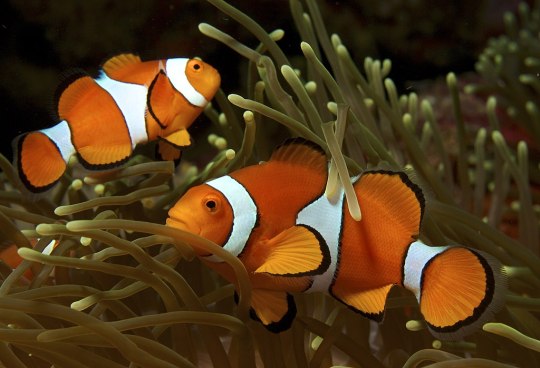
Like many reef fish, they have the ability to change biological sex. For anemonefish this is triggered by environmental circumstance. It seems that a group living together in an anemone is led by a territorial female and a main dude who watches over eggs, while a bunch of juvenile dudes*** hang about. If something happens to the female, the main dude starts transitioning to female and one of the young guys matures into the new househusband.
But here's where it gets really interesting: it can take months to years for the transition to fully take place. The change, scientists have discovered, begins in the brain.**** And for months or years,
The transitioning fish thus ha[s] a female brain but male gonads. Which could be considered confusing for the fish, but Rhodes is certain that, if asked, the fish would say it's female.
"That's the great thing about these fish: they will tell you," he told me. All he has to do is put the fish in a tank with another female. In the wild, these highly territorial fish refuse to share an anemone with another female, and they are guaranteed to fight, often to the death. {...} The simple experiment shows that these transitional anemonefish both behave like females and are recognized as females by other fish, even though they have testes. It's a very clear demonstration that brain sex, and thus all sexual behaviour, and gonadal sex can be uncoupled. {...} This exposes the flaw in assuming a linear relationship between gonadal sex, sexual identity, sexuality and sexed behaviour, even in a fish.
"The anemonefish question the way that we assign sex," Rhodes added. "The message of these fish is you should not define sex by the gonads."
Like, look. We shouldn't anthropomorphize animals when we can avoid it. And people shouldn't need scientific evidence to deserve respect from others. But. I hope any people out there struggling with their gender identity can see with this example that wherever you think you fall on that spectrum, nature has a space for you. And nature believes you when you say who you are. You are natural, and real, and it's not just in those admittedly delightful anecdotes where a friend's dog or cat who usually has trouble with a certain type of human made you the exception like they knew your gender before you did...just...it is concrete and it's everywhere; it's in birds and lizards and fish and mammals of all spots and stripes.
Be proud, even if you can't yet be loud about it. I love y'all. Happy pride month.
Also, somebody should do art of anemonefish in the various appropriate flag colors ^_^
*The book is called Bitch: On the Female of the Species by Lucy Cooke. A highly enjoyable read except for one sentence that stuck in my craw about Hawaii. Like lady I know you're British and probably ignorant about it but making a comment about how people are not native to the islands is not the way.
**Richard Dawkins is dragged fucking immediately lol
***The 'juvenile dudes' are technically 'juvenile dudes (gn).' The book explains, "Their immature gonads are officially 'ovotestes' with the potential to develop into male or female reproductive organs. They have some testicular tissue, but it's not actively producing sperm, and they also have ovarian tissue with undeveloped eggs." But of course ~Science~ has assigned them as males because that's the default, riiiiight? [Wrong on two levels. Evolutionarily speaking females likely existed millions of years before males did. I'm telling y'all I learned stuff reading this!]
****This has to do with the 'pre-optic area' which contains more neurons in females because it's concerned with egg production, etc. But multiple scientists caution in the book not to overemphasize the differences between sexes a) because like, what is a binary, and b) biological differences, especially in the brain, are not that significant.
#animals#fish#science#books#seriously though it's well researched and comes with a huge bibliography if you're interested in learning more#comes with a good sense of humor too#anyway this goes out not just to my fellow animal lovers#but to women like me who chafe against the roles society has set for us#and most especially to any trans genderfluid nonbinary etc folks out there#if you read this book you WILL find one or more animals to start adoring#and also you will probably learn more than you will ever want to know about the different ways spiders have sex
1 note
·
View note
Text
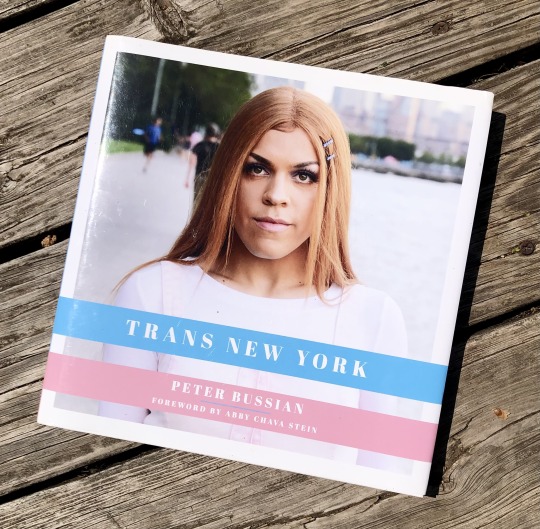
Another book review for Pride Month, yo!
Trans New York by Peter Bussian
“It is easy for people to misunderstand and even hate an idea, a concept. It is a lot harder to hate a human being, especially if you know their story, their journey. Of course, people can still be hateful, but if they know about the struggles of their fellow humans, the chances that they will accept and love them are much higher” -Abby Chava Stein, from the Introduction.
Trans New York is a photography book giving a glimpse into the lives of transgender individuals living throughout the city, much in the style of Brandon Stanton’s Humans of New York blog.
The folks interviewed run the whole range of ages, genders, and experiences. Some people are trans, others genderfluid, nonbinary, or genderqueer in some other way. Some people say they have finished transitioning, others are still in the process. And others feel their gender is a continuous evolution with no point at which their identity is complete.
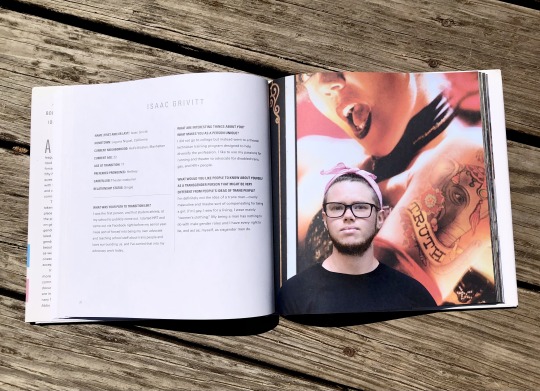

Each profile has basic information: preferred name, preferred pronouns, hometown, current age, age of transition, etc, along with three open-ended questions (paraphrased): What was your path to transition like? What makes you unique as a person? What would you like people to know about yourself that are different from typical assumptions about trans people? I have to admit these questions feel a bit limiting to me as they focus only on the person’s transness. While I understand that this is because the focus of the book is on being transgender, it would have been nice to devote some more space to finding out who these people are as individuals. What are their hobbies? Their passions and goals? What is their most beloved memory? And so on.
The interviews due not shy away from trauma and struggles. Some people mention abuse they suffered growing up and how it has shaped them. Others describe having to advocate for themselves because they had no other resources.

Some of the photos can feel abrupt and unframed, as if the photographer just caught a quick shot of someone as they were going about their day. Since Bussian is a professional photographer with 20 years of experience, I assume this was a deliberate stylistic choice to portray the interviewees as a part of their world, rather than as models or subjects for examination. In this way, perhaps, it allows trans readers who may not know many- or any- other folks like themselves to get a glimpse of the diversity of trans lives. And perhaps cis readers too will come to a better understanding and empathy with people who are really not much different from themselves.
You can get a copy at Bookshop.org
Or Amazon
4 notes
·
View notes
Text
A few tropes to avoid: LGBT addition
Note that this is not a complete list, but rather some tropes that I tend to see a lot that are tiring if not downright offensive and hurtful. This turned out to be a very long post, so most of it ended up below the cut. Press J to skip.
Gay/Lesbian
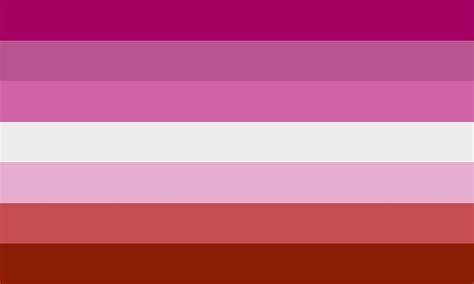
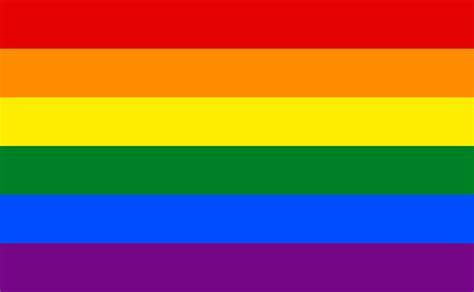
[id: two flags. The one on the top is the lesbian pride flag. The one on the bottom is the gay pride flag /end id]
Anything hypersexualizing
It’s just... not good representation. No one likes to be hypersexualized. Ever.
The one gay/lesbian in the heterosexual friend group
This tends to come across as tokenism. Not real representation. Also, people tend to be friends with people they connect with. This is why a lot of LGBT people form groups. It’s actually far more likely in the real world for there to be a gay friend group with one straight person.
The homosexual dies first
Yay there’s a gay/lesbian person! Representation! oh... they died five minutes in? That sucks.
Look, if there’s a lot of death happening in your story, it’s fine if a gay person dies, but please stop making the first death a gay person. And if you decide to kill of a gay person, make sure it’s not the only one.
The gay that refuses to admit he’s gay but he’s super feminine so he has to be
Femininity does not equal being gay. I’m not entirely sure where this trope (and general misconception) came from, but it’s tiring to see it getting beaten into the ground
Femininity is fine as a trait, but it should not be the tell that a character’s gay. Finding other dudes attractive or being attracted to other dudes should be the main tell.
(Bi/pan, Trans, Nonbinary, Genderflux/genderfluid, Ace/aro all below the cut)
Bi/Pan
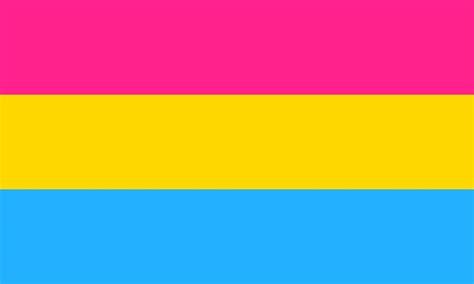
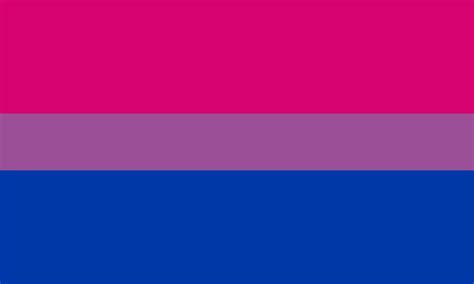
[id: two pride flags. The one on the top is the pansexual pride flag. The one on the bottom is the bisexual pride flag /end id]
Anything hypersexualizing
See above. I’m tired of it. It’s not good representation.
The bi/pan character is a cheater
Bi/pan people aren’t any more likely to cheat than anyone else. The fact that the general pool of people bi/pan people are attracted to is larger doesn’t really change that. Please don’t make your bi/pan character a cheater.
The “no this character is with a [guy/girl] now so that means they’re [straight/gay] not bi”
This is bi erasure. Bi/pan people are still bi/pan when they’re dating a dude. Bi/pan people are still bi/pan when they’re dating a girl. Bi/pan people are still bi/pan when they’re dating a nonbinary person. Period.
The “this character can’t be bi/pan - they’ve only slept with one gender/they’re a virgin”
Being bi/pan is about being attracted to people of two or more genders/being attracted to people regardless of gender. It doesn’t matter who they’ve slept with. If they’re bi/pan, they find more than one gender attractive.
Trans
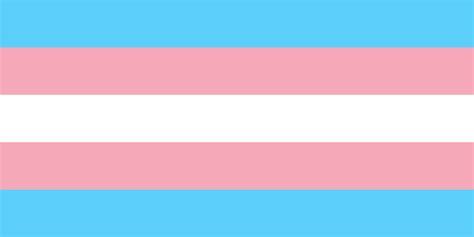
[id: the trans pride flag /end id]
“Hi I’m John, but I used to be Jane.”
In no world is this realistic. Trans people are not going to introduce themselves to anyone by using their deadname (their name given at birth that no longer applies to them). There are lots of other ways to show a character is trans.
Trans dudes have to be hypermasculine, and trans girls have to be hyperfeminine
This is just untrue... being a more affeminate trans dude doesn’t make him any less of a man. Being a more masculine trans woman doesn’t mean she’s any less of a woman. Not conforming to the most stereotyped version of their gender does not mean they’re not a valid person
“He - she - did the thing” when referring to a trans woman and vice versa for a trans man in prose.
I specify in prose because if someone has just come out, and characters are tripping up over pronouns but trying to learn and correct themselves, then that’s usually fine (though make sure to research what’s acceptable around this and what isn’t).
The whole calling attention to someone’s pronouns by misgendering someone and then flamboyantly correcting yourself when they’re trans thing can actually be kind of transphobic. When you’re writing prose, you don’t have any excuse so don’t do this.
The trans guy finding a bunch of ace bandages (or something similar) and using them to bind his chest
Yes, this is realistic. Yes, a lot of people do this, but it is an extremely unsafe way to bind. If your character binds, do your research. If they bind unsafely then SHOW THE NEGATIVE RESULTS of binding unsafely (difficulty breathing, cracked ribs, spinal problems, etc) they can be pretty severe. A lot of people don’t know how to bind and take cues from what they see in the media. Don’t perpetuate false information.
Nonbinary
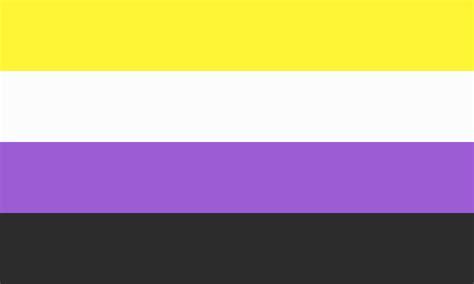
[id: the nonbinary pride flag. /end id]
The nonbinary character has to be flatchested and vaguely masculine in order to be nonbinary
Nonbinary people are still nonbinary when they’re feminine. Nonbinary people are still nonbinary when they’re masculine. Please reflect this in your stories, as people take cues for how society works based off of the cumulation of the media they recieve.
Misgendering during an argument
This is actually really damaging to nonbinary people. What happens is that people see that it’s okay to misgender someone if they’re mad, when in reality, pronouns are a right, not a privilage to be stripped away whenever you get mad. If you were really mad at your country’s leader, you wouldn’t misgender them when you rant. You can hate them with all of your being and you probably still wouldn’t misgender them. Why is it any different with nonbinary people?
All the nonbinary people were AFAB (assigned female at birth)
It’s not inherantly wrong to have AFAB nonbinary folk in your story, but it is nice to see AMAB (assigned male at birth) nonbinary characters as well. There’s a lot less representation for them, so the more representation the better.
Being nonbinary is a phase - you’re actually binary trans or cisgender
Some people identify as nonbinary and do later find out that they identify more with a binary gender, but there’s also a lot of people who are just... nonbinary. It’s hugely dissapointing when a character that’s meant to be representation turns out to actually not be. Especially if they were the only nonbinary character.
Genderfluid/Genderflux
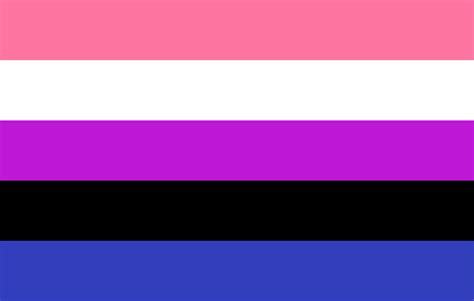
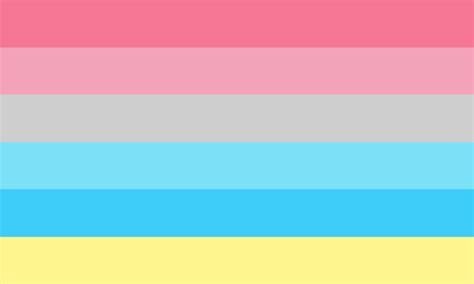
[id: two flags. the one on the top the genderfluid pride flag, and the one on the bottom is the genderflux pride flag /end id]
The one character in the background who’s genderfluid/genderflux in chapter three and then never seen ever again
Just include a genderfluid/genderflux character that’s actually relevant. It’s not that hard, and it’s really not that confusing. Their gender changes sometimes. They might switch their pronouns accordingly.
The genderfluid character who’s short, vaguely masculine and has brightly died hair.
This one isn’t exactly offensive, per se, but it does feel like this is the only representation of a genderfluid character that I ever see, and that my friends ever see. Diversity is more than just having people who use different labels. It’s also about showing the different walks of life within those groups. There are a lot of genderfluid/flux people who don’t look like the stereotypical genderfluid/flux person, and they deserve representation just as much as everyone else.
The genderfluid character is the alien
This is a cop-out. It’s fine if you’ve got a race of genderfluid/flux aliens. Awesome, actually! Just add a genderfluid/genderflux human character too.
The genderfluid person who wakes up in the morning and “decides” if they’re going to be a boy or a girl today.
There are a couple things wrong with this. The first is that genderfluid people don’t just “decide” which gender they are. Their gender is more of it’s own entity. There’s not much of a choice with it. It just is.
From my own experience I can assure you that genderfluid people don’t just wake up in the morning with a random gender and then that’s their gender for the day. For me personally, my gender will change somewhere between once every three hours and once every three days, but it’s surprisingly rare that it’s overnight. It can even happen in the middle of conversations and stuff like that.
Genderfluid people don’t just switch between being a boy and being a girl. There’s a lot of space in between: nonbinary, maverique, agender, just to name a few.
Ace/Aro

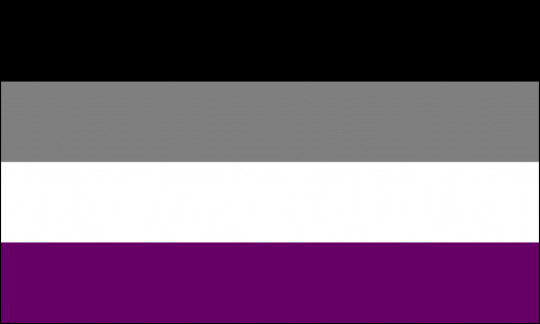
[id: two pride flags. The one on top is an aromatic pride flag, and the bottom is an asexual pride flag. /end id]
The character’s horrible backstory turned them ace/aro
This is not to negate the fact that some people do identify as ace/aro after a traumatic event. That being said, most ace/aro people are just...ace or aro. There wasn’t any backstory. That’s just the way they are. Seeing that a lot more represented would be awesome.
The character’s got a mental illness because they’re ace/aro
Being ace/aro does not mean you have a mental illness. The idea that it does being spread through the media people consume is very harmful and it increases the stigma around being ace/aro, in a place where there really shouldn’t be. Yes you can have a mental illness and be ace/aro, but they’re not usually correlated.
The ace character can’t be ace because look they’ve got a partner!
Ace is short for asexual meaning you don’t feel any sexual attraction. That does not mean you can’t feel any romantic attraction. Therefore, your character can be hella ace and still have a partner that they’re romantically attracted to
If your character was aroace (a term that’s short for aromantic asexual), then they probably wouldn’t be interested in having a partner.
The character who’s aro/ace but then “finds the right person” right at the end
If they’re demisexual/demiromantic, then that’s different, but it does make it feel like the “flaw they were overcoming” was being ace/aro, and that’s both damaging to the community, and it’s also just dissapointing. There are a whole host of other flaws that your character could have that are much more worth the reader’s time.
#writing#writeblr#writing diversity#lgbt#writing lgbt characters#lgbt tropes#lgbt tropes to avoid#gay#lesbian#bi#pan#trans#trans*#nonbinary#genderfluid#genderflux#ace#aro#aroace#writing diverse characters#olive's writing vibes
220 notes
·
View notes
Text
book blogging #3: is this book, you know... gay?
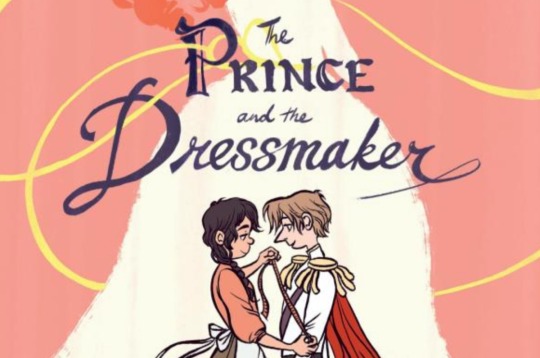
I’ve been vaguely aware of Jen Wang’s The Prince and the Dressmaker for some time, and had the vague understanding that it fit somewhere in the genre of “warm and fuzzy queer coming of age graphic novels” that seems to be happily proliferating these days, and while I’m very much a fan of that development as a whole, I wasn’t in any particular rush to seek it out.
then the pandemic happened, everything closed, my reading started to consist mostly of whatever my friends can lend me, etc. we’ve had this conversation before.
textually, no explicit identities are ever claimed in this graphic novel; no one uses the words “transgender” or “gay” or “bisexual” or “queer.” that’s understandable, especially is a pseudo-historical setting like this one when those words weren’t have been used or understood the way they are today, although Wang is hardly trying to write historical accurate fiction and time period is deliberately vague. it’s a fairly significant plot point that Paris’ first department store is opening up over the course of the story, and in the real world that occurred in 1852. however, the titular prince is Prince Sebastian of Belgium, and since absolutely no such prince existed in 1852, it seems that this story is taking place in an aesthetically pleasing alternate history. neat!
unfortunately, like many fictional worlds, this one isn’t exempt from real world ideas about gender, and Prince Sebastian is very, very worried about what will happen if anyone discovers that he, the sole heir to the Belgian throne, really enjoys wearing dresses. the only people he trusts with his secret are a faithful servant and Frances, the dressmaker who catches Sebastian’s eye with a particularly daring and controversial design. to boil down the plot very small, Frances becomes Sebastian’s secret designer, constructing avant-garde costumes for him to wear out on the town under the alias Lady Crystallia.
so, how are we - the worldly queer readers of 2020, with our nuanced understanding of the many ways gender, gender presentation, and sexuality can interact - meant to understand Sebastian?
right off the bat, I think it’s fair to say he’s certainly not meant to be a representation of a trans girl coming into her identity. Sebastian’s doesn’t seem bothered by being a boy, only by the limitations that societal expectations have placed upon his wardrobe. he is certainly happier and more confident when he’s dressed up in wig and heels and introducing himself as Crystallia, but that primarily seems to come from being able to shed the expectations usually placed upon him and being permitted to dress as he likes. one gets the impression that Sebastian would be perfectly happy to use his real name and he/him pronouns while wearing his dresses, if only he didn’t have to worry about someone learning his secret.
it seems most accurate to say that Sebastian could most accurately be compared to a baby drag queen, which made it extra surprising that (spoiler alert!) he ends up having feelings for a girl.
more specifically, he ends up developing feelings for Frances, and she likes him back, and they have some truly adorable little moments of falling in love. by the end I was really rooting for these kids to overcome their inevitable third act misunderstanding and get back together. and even as I was rooting for them, I was wondering: wait, so is this gay at all?
despite Sebastian fitting many tropes often associated with young gay men - he loves traditionally feminine clothing, he doesn’t relate to his father’s love of sports or like physical labor, he’s extremely nervous about his parents expectations that he will find a wife - he never actually shows any particular interest in men or, indeed, anyone but Frances. while that certainly doesn’t rule out that he could be bi or pan or an asexual who experiences romantic attraction, going purely by what’s on the page it doesn’t seem implausible that Sebastian is... a straight, cisgender teenage boy who happens to really like wearing dresses. I’m not saying that’s definitively what he is - I think there’s a strong case for Sebastian being genderfluid or nonbinary - but there’s also no categorical proof that he’s not.
what about Frances? while Sebastian initially tries to hide his identity from her, including that he’s a boy, she finds out the truth before their first meeting is over, meaning she’s under no false impressions about who exactly she’s falling in love with. the first time we get a hint of blossoming romance is a classic scene of Frances watching her crush while he’s unaware, then catching herself staring and looking away while blushing. this happens to take place while Sebastian has his long red wig on, lovingly brushing out his hair, looking pretty femme. later on the two of them spend a night together that is clearly a date, complete with an adorably awkward goodnight, all of which takes place while Sebastian fully presenting as male. truthfully, none of this tells us anything about Frances’ orientation(s) either, except that external presentation is absolutely no hurdle for her.
so this could, quite feasibly, be a cisgender, heterosexual couple, with nothing in the text to either strictly confirm or refute it. if you’re looking for canon LGBT rep, you might be a bit disappointed. but is the book queer?
there is a difference, after all, especially if we go looking for queerness in the academic sense, the kind that’s less concerned with exactly quantifying identity and is much more interested in playing around to see exactly how far ideas of gender and sexuality can be warped, distorted, and otherwise used like so much Play-Doh. at very least, there’s an absolute treasure trove of gender nonconformity on Sebastian’s end, which I don’t think exactly needs spelling out. Frances is a more subtle rebel for falling in love with Sebastian in all his skirts and glitter; without going too far down the gender theory rabbit hole, heterosexuality is traditionally construed as an attraction between masculine and feminine opposites.
obviously I’m not coming at you to argue that Sebastian as a cis, straight boychild who likes dresses is more radical than a Sebastian who is explicitly not-straight or not-cisgender. but as someone who personally doesn’t jive well with the impulse to neatly label each and every facet of identity, there’s something about this very sweet book that hits like a breath of fresh air. sure, Sebastian worries about being known as a boy who wears dresses, but he never seems to worry about what his clothing preferences mean for his own gender or sexuality. likewise, Frances has a lot of concerns about the pressures of keeping secrets and trying to build her own career, but she’s spectacularly untroubled by the implications of having a crush on someone with such a wildly fluctuating gender presentation.
Frances and Sebastian know what they like - wearing/making spectacular dresses, and each other - and don’t worry about the rest, and I think there’s something really simply but powerfully sweet in that ability to simply embrace and explore what makes them happy without spiraling into an existential crisis about it. the problem is always external, always in the form of outsiders who don’t understand, never grappling for internal understanding. thematically that’s all pretty queer, so my ultimate grade is this: if nothing else, this book is one hell of an ally, and I think it has a lot of potential to resonate with folks across a wide variety of queer identities. it certainly made my heart all warm and tingly :)
36 notes
·
View notes
Link
THIS.
This this this this this!!!
I couldn’t find the words to say why I’ve had a problem with the phrase “separating the work from the author,” since it was such an instinct-level thing. I tried to ignore my instincts because I couldn’t put it into words. (And frankly, as a bi genderfluid person, I’ve been gaslit so many times on this sort of thing, I’ve learned to doubt my instincts...)
But this is it. Mike (of all people, if you know the webcomic: content warning for other pages, contains murder, violence, verrrry dark humor, mature content, readers be advised the archive is HUGE, etc, etc) is hitting the nail on the head.
“I realized ‘separate the work from the author’ is easy for me to say when I’m not one of the people they dehumanize.”
That right there, folks.
That is the single most important thing for us as writers. Not just as readers. (Don’t get me wrong, that’s important too, but this is about writers writing.)
Our works & our personal opinions will bleed into each other.
Hell, I’ve read exactly 2 books of Orson Scott Card’s, and i could tell he had a homophobic hate-on, and particularly loved torturing boys & young men. The writing, the stories, those were intense, for the most part well-written...but those particular hateful scenes were disturbing, to say the least.
We put a little bit of ourselves into every book. Sometimes that little bit of ourselves is not a healthy or happy place. Sometimes, it is a very, very ugly place.
On the bright side, we can always strive to be better people. We can strive to be better people in our writings, too. Because while I’ve said that what we write, others absorb, internalize, and return to the world...this applies to us, too.
What we imagine, what we write, we ourselves read, absorb, internalize, & emit.
The character of Mike in Something*Positive started out as a shitty person. He has managed to grow into a much better person over the years. We can do that ourselves, and we can certainly do it better. We’re in control of our own thoughts, actions, and dialogue after all, and we don’t have to say things paced for hitting any 4 panel or per-page comedic beats.
I got my writing career based on the quality of my Harry Potter fanfic.
I cannot admire JK Rowling anymore. I will not tolerate her insulting women just because they had to discover they were women years after they were born. I loved Harry Potter (especially books 1-4), but...no more.
Now, I’m not perfect myself. I’m no angel. But the things I rant about are in support FOR my fellow human beings’ right to exist in peaceful coexistence with each other, without trying to harm each other. (*Nazis will still get punched, because you can stop being a Nazi at any time, as that’s a series of choices. I don’t have a choice about being genderfluid or finding more than one gender attractive. I do have a choice on whether or not to hate others!)
Give an author a chance to realize they’re saying some hateful shit, offer them the opportunity to change and grow into a better person.
If they not only double-down, but triple and quadruple and sextuple-down on a hateful position...well, electrons from all those ebooks are 100% recyclable, and so is most of the paper in physical books, too.
...Btw, I’m genderfluid, but I don’t consider myself transgender, because when I’m feeling female, I am cisgender in that moment, just as when I’m feeling agender (or, rarely, male), I am trans. But because of my fluidity, I get to walk through the world with a far higher level of privilege than most transgender folk. I have “passing privilege” because I don’t care about presenting in any particular way most days (agender being the equivalent of “wearing comfy clothes all the time, neither particularly feminine nor masculine” and I love wearing comfy clothes literally.)
However, I acknowledge that other nonbinary folks may consider themselves (case by case basis) as transgender, and I support that 100% for them. Just don’t try to force it on me, because I am acknowledging my passing privilege by not applying the label to myself. It’s not a pride-filled thing to acknowledge it.
And by acknowledging it, I am more aware of it, and how it impacts not only my life, but the lives of others.
Which is Mike’s point, if you take the time to think about it. I do have passing privilege, but not every non-cisgender person has that. Because of my passing privilege, I don’t seem like one of those people being dehumanized by all this TERF-y bullshit...and so I need to be aware of my privilege, so that I can use my seeming/occasional cisgender-ness to advocate for those who don’t have passing privilege.
We ALL need to be more aware of our own privileges as well as the marginalizations & dehumanizations of others.
5 notes
·
View notes
Text
NB/GQ Survey 2017 - the UK results
This report is very long! Click here for the TL;DR. Click here for a printable Google Doc.
~
Well, it’s been a wild year. Three times as many participants as usual, combined with new survey software and new spreadsheet software and health and financial difficulties, has caused some epic delay, plus a few more months of delay for the UK report - but we made it.
The survey ran from 6th February until 1st May 2017 (84 days), with 9,932 participants, of which 1,357 were in the UK. It was promoted on social networks, wherever participants were willing to share. People were invited to take part if they were not fully included in the binary of "anyone whose gender is always entirely and solely male, and anyone whose gender is always entirely and solely female.” It asked:
Which words from a list (plus a textbox) participants identified with [optional, checkboxes];
Which title from a list (plus a textbox) participants most wanted to use [optional, single answer only];
Which pronouns from a list (plus a textbox) participants were happy with [optional, checkboxes];
Whether the participant is in the UK [required];
Age [required];
How you found out about this survey [optional, checkboxes];
The spelling of nonbinary/non-binary/non binary [optional, checkboxes].
A couple more questions were asked, the results of which I’ll not review in this report - I’ll go into more detail later.
[ LINK TO EXCEL SPREADSHEET OF RESULTS HERE ]
~
Question 1: Which of the following best describe(s) in English how you think of yourself?
The top five responses were:
nonbinary - 64.5% (down 2.9%)
genderqueer - 33.7% (down 6.5%)
trans - 32.2% (down 3.9%)
agender - 27.6% (up 0.2%)
fluid gender/genderfluid - 27.3% 29.8 (down 2.5%)
Here’s the graph of identity words that got over 1%:
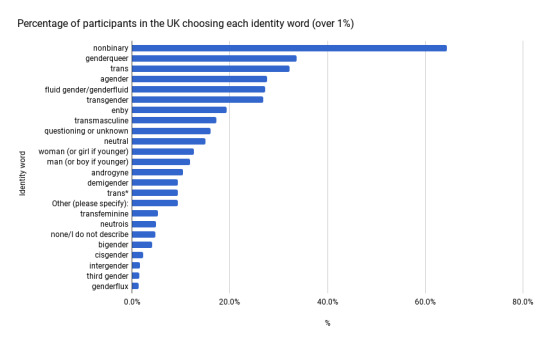
One identity word that wasn’t offered as a checkbox option made it over 1% this year both in the UK and worldwide, and will therefore be offered as a checkbox option next year: genderflux. That’s when one’s gender fluctuates in intensity without necessarily changing. (Not to be confused with genderfluid, when one’s gender changes.)
I will also be adding “binary” to the list next year - because I list cisgender alongside transgender, so it follows that I should list binary alongside nonbinary.
Some numbers I enjoyed:
23 identity words were offered in the survey.
23 identity words were typed into the “other” box more than once, and 60 identity words were typed into the “other” box only once.
That’s 106 identity words total.
People chose on average 3.7 identity words each - around the same as last year.
The most common number of identity words chosen was one - 21% of participants chose one identity label, around the same as last year.
93% of people chose between 1 and 7 identity labels - a little higher than last year.
The worldwide report looks into the shifting popularity of the top ten words for both identity and pronouns, if you’re into that sort of thing.
A note on bias
It’s been bugging me for a couple of years that the survey is probably biased. I’ve been calling it variously the “nonbinary survey”, the “nonbinary/genderqueer survey”, etc. just because those terms are the most popular and I wanted to attract as many participants as possible. Unfortunately, this means that folks who identify as these things are more likely to opt in and take the survey, and people who don’t identify as these things are less likely to realise it’s aimed at them.
I wanted to try to change things this year, but the best I could manage was changing the title to NBGQ. I couldn’t think of a title that wasn’t long and rambling, like “the survey for people whose genders are not tidily described by the binary of ‘always entirely and wholly male’ and etc etc etc.” I suspect that the small change I made didn’t make much difference, so I will keep trying to find a better name.
~
Question 2: In a magical world where all title fields on forms were optional and write-your-own, what would you want yours to be in English?
This question allowed only one answer, though people very occasionally sneakily used the text box to tell me about either-or situations - and those titles were counted too.
The top 5 were:
Mx - 37.6% (down 3.7%)
No title at all - 27.2% (down 6.4%)
Non-gendered professional or academic (eg: Dr) - 12.5% (up 3.6%)
Mr - 5.8% (up 2.9%)
Miss - 4.2% (up 1.8%)
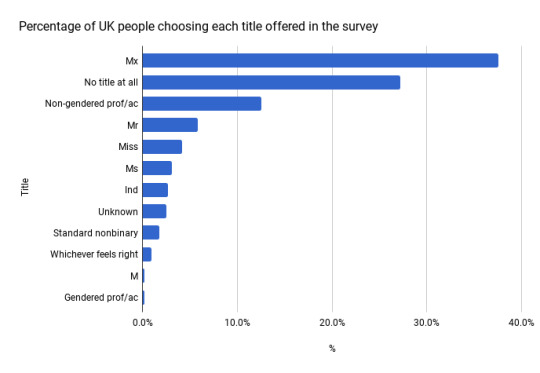
(M was not offered as a checkbox option in the survey, but I’ve included it in this graph because it got more than “gendered professional or academic title”, which was offered in the survey.)
Mx and “no title” have swapped places each year since they were both included in the survey, so the fact that they’ve done so this year is not very notable.
This year I was able to include a text box to allow people who selected “a standard title that indicates my nonbinary/genderqueer identity” to write in what they use to do so. Of the 25 people who chose that option, 60% left that box blank. Each suggested title was entered only once.
A change I would like to make next year is to specify that participants should be currently entitled to use the title they choose. A lot of people choose “non-gendered professional or academic title” and then say “I’m going to get a doctorate so that I can use Dr”. There’s also often a smattering of people who enter military titles and nobility titles. People might be writing these in thanks to the “in an ideal world” tone of the question! So I would like to make the question more clear and specific to reduce that confusion.
~
Question 3: Supposing all pronouns were accepted by everyone without question and were easy to learn, which pronouns are you happy for people to use for you?
The top 5 are the same as last year:
Singular they/them - 78.4% (down 0.4%)
He/him - 29.8% (up 7.8%)
She/her - 27.9% (up 3.9%)
Mix it up - 11.9% (down 0.8%)
None/avoid pronouns - 10.3% (up 0.4%)
9% of people didn’t select any of he, she or they - exactly the same as the international results.
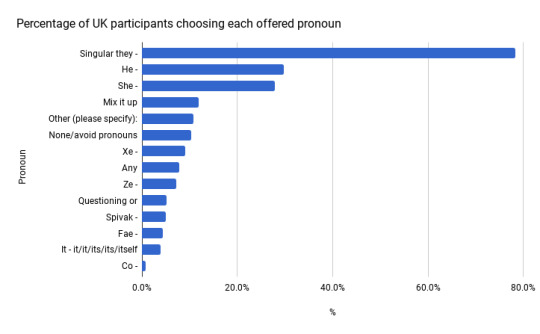
More numbers:
9 specific pronouns were offered in the survey, along with 4 descriptions (for example, “none/avoid pronouns”).
13 pronouns were typed into the “other” box more than once.
44 pronouns were typed into the “other” box only once.
That’s 71 pronouns total.
People chose on average 2 acceptable pronouns each, the same as last year.
Most people (44%) chose only one pronoun.
About 72% of people were happy with only one or two pronouns.
The main change for this question is that last year I tried to combine the numbers for pronouns that were clearly intended to all be the same set, but with almost 10,000 participants that was just not possible. This year, the following hypothetical examples would have each been counted individually:
xe/xem
xe xem xirs
xe/xem/xirself
...etc. There were 28 totally unique write-in entries worldwide for pronoun sets beginning with “ne”, and 26 for “ze” - many of them entered more than once.
Next year I am determined to collect information on each of the five forms of neopronouns, even if that means a participant has to fill out a five question section for each neopronoun they’ve claimed for themself. Ideally I would like to somehow create a form that will do this elegantly, but I know already that I can do it clumsily using Google Forms, so we’ll see. It’s important to me to count the more popular neopronouns accurately.
Notably, the “co” pronoun set was a checkbox option that got under 1% this year, and so it won’t be included as a checkbox option next year.
The worldwide report looks into the shifting popularity of the top ten words for both identity and pronouns, if you’re into that sort of thing.
~
The extra questions
There is more detailed investigation of the statistics regarding age and referring sites over in the worldwide report. For this report I’ll just show how the UK compared to the worldwide statistics:
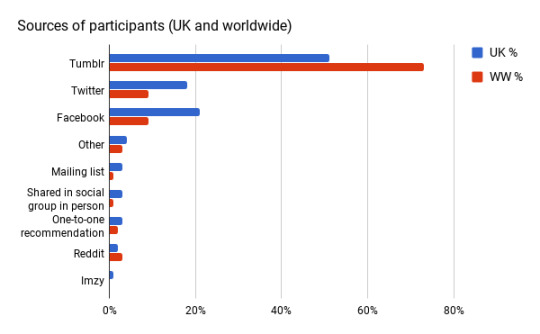
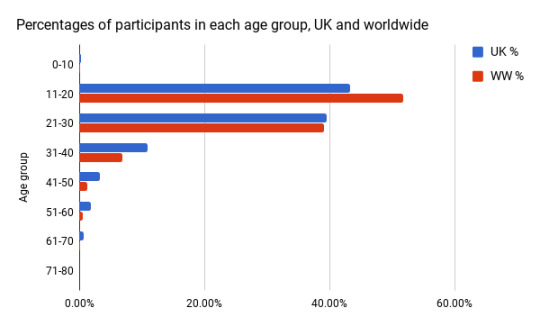
UK people were more likely to find the survey via Facebook or Twitter and less likely to find it via Tumblr. Participants from the UK were also less likely to be teens and more likely to be over 30.
Again, I’ve given an overview of the results of the questions about the spelling of “nonbinary” and umbrella terms over on the worldwide report. I don’t feel that extracting the UK-only results would be very helpful; instead I’ll work on removing bias as much as possible in future surveys.
~
The questions I ask
What should the third gender option on forms be called? - Still no consensus in that area. I won’t feel comfortable recommending the most popular (nonbinary) until I’ve done more work to remove bias in future surveys.
Is there a standard neutral title yet? - Not yet. Mx is looking very promising, and is consistently far more popular than all other titles, but just as many nonbinary people want no title at all. It’s really important that activists campaigning for greater acceptance of gender diversity remember to fight for titles to be optional, too.
Is there a pronoun that every nonbinary person is happy with? - As in previous years, no. The closest we have to a standard is singular they, and so I will use the data to campaign for journalists and anyone else with a style guide to allow it. But around 1 in 5 (20%) of us are not happy with singular they, and 9% of us don’t like he, she or they pronouns.
Are any of the neopronouns gaining ground in a way that competes with singular they? - No. This year the closest is “Xe - xe/xem/xyr/xyrs/xemself” (9% in the UK compared to singular they’s 78%). Users of these neopronouns will probably not reach consensus for many years - language and especially pronouns can be very slow to settle and gain ground. Even if one neopronoun does become very commonly used, many will continue to use other neopronouns for a long time to come.
~
This year in review
There have been a lot of big changes.
We tripled participation! We went from consistently ~2,000-3,000 participants worldwide to TEN THOUSAND. This still boggles me. I feel a little bit overwhelmed that you all trust me with personal information about yourself, and I am excited and honoured every year to play with all the delicious data. From a happily hyperfocused human to 9,932 participants, thank you. <3
The survey now has its own social media presence! Which means people can follow me without having to put up with wittering about the survey, and people can follow the survey without having to put up with me wittering about... well, everything else. It probably helped the survey look more legit, which may in turn explain the increase in participation.
I crowdfunded to cover costs! Originally this was just going to be the survey service, but then it ended up covering MS Excel as well. This process was fraught with hiccups and bad decisions, which is probably not surprising since I’ve never done this before. We reached the £330 target in only a few days, which was wonderful, and it helped a lot.
I used a paid survey software service! Specifically, SmartSurvey. I would recommend it. They had a pay-monthly tier, which allowed me to subscribe to that with the crowdfund money and buy MS Excel in an emergency fashion to process the results when Google Sheets couldn’t handle 9,000+ responses, the wuss. SmartSurvey processed checkbox answers more helpfully, allowing me to process write-ins more easily, among many other lovely features. It wasn’t perfect, but it was a big improvement.
I used MS Excel to process the results for the first time! This was not as much fun as Google Sheets. I had to learn a whole bunch of new techniques to count everything, and some of them didn’t even have Excel equivalents at all. It is also hella buggy and crashy on Mac. Overall, it’s pretty much been a nightmare.
The results are therefore available as a MS Excel file instead of a Google Sheet this year. I am sad about this, because it’s less accessible in a lot of ways. Not everyone has access to Excel! Folks are of course welcome to download the files and mess about with the data however they want.
In a more general sense, academics have approached me with questions about the results, even occasionally asking me for advice or telling me that they will be mentioning the survey in their [academic writings]. One person even sent me a French academic paper they’d found that referenced the 2016 survey, which was fun! I do think that anyone with relevant knowledge can probably see that my work is amateur and flawed, but nonetheless I still think it can be useful - and my experience this year is that it has been useful.
Also in a more general sense, companies and organisations are clearly using the results of the survey to become nonbinary-inclusive. For example, HSBC introduced 10 new titles for nonbinary people this year and a fair few of them are popular among participants of the 2016 survey. Similarly, Bristol Water “did some research and found that [Mx, Ind and Misc] were the most popular” - they don’t refer to the survey directly but those three titles were the three most popular in the 2016 survey. I feel that the results of this survey are making it easier for companies who want to be inclusive to make changes, because let’s be honest, if it’s a choice between ignoring nonbinary people and doing expensive specialist research they’re going to ignore nonbinary people...
What I’ll do differently next year
I will probably change the name of the survey and the associated social media URLs. This will be very disruptive, but I think it will improve the reliability of future survey results by reducing bias.
I will continue to look for better survey and statistics software. Specifically, I want to ask about neopronouns in a better way, and I want software that can handle 10,000+ responses.
Closing thoughts
You are all awesome. I love that you are all willing to trust me with this stuff, and I feel very lucky to be able to do this whole thing because I find it really fun and interesting. I learn so much every time. Thanks for another great survey experience!
See also
A list of links to all results, including UK and worldwide, and including previous years
The mailing list for being notified of next year’s survey
~
SUPPORT ME!
First of all, I do this basically for free (the crowdfunded money went entirely on survey software and MS Excel), so if you happened to stumble onto my Amazon wishlist and accidentally fall on an Add To Cart button... well, I would be immensely grateful. ;)
Second, my girlfriend Andréa and I got really fed up of online dating and social network sites that were not fully inclusive of nonbinary and trans people. Either they don’t offer gender options for us, or they don’t include us properly in searches, or they force us into particular pronoun sets, or we are relegated to an “other” box, or all of the above. So we set about designing Starfriends.org (it was mostly Andréa), which uses a pretty revolutionary tagging system to match you with people based on all kinds of diverse stuff which can include gender if you want, and quite frankly the pronoun system is just VERY EXCITING, I’ve never seen anything like it on any other site. It’s pretty quiet and still in alpha (so it’s a little bit buggy and not fully fleshed out yet), but if this sounds like something you might be into, you’d be very welcome there. :)
40 notes
·
View notes
Text
Autistic Survey: Results
As you may be aware due to my splashing this all over my social network presence, I’ve been running a survey of autistic people for 11 days, since January 19th 2017.
There were 1340 usable responses at closing time. This is after I removed one duplicate, removed two or three abusive responses, and removed one at the request of the participant. I promoted on Tumblr, Twitter and Reddit, and I’m aware that others promoted on Facebook on my behalf. There’s a more detailed breakdown of where everyone came from further down.
This survey was ultimately pretty aimless and led by my own curiosity. I wanted to know how we as autistic people tend to think of ourselves, how we identify and describe ourselves, and whether/how we are diagnosed. I wanted to test a few stereotypes that I’ve picked up over the years. I also threw in a couple of questions for my own personal wossname, like monogamy/non-monogamy, and how people feel about Autism Speaks, etc.
I like to do this kind of stuff for fun, and am in no way professionally or academically educated/experienced. Because it’s on the internet, self-selecting, and mostly promoted on a small number of social networks, the results are hella biased and can’t really be held as representative of any group except autistic users of Tumblr, Twitter and Reddit. Still, with over 1,300 responses, I think the results are pretty interesting.
You can see the results in full on Google Sheets here. Beware, it is huge and unwieldy. Feel free to make a copy of the sheet and mess about with the stats however you want; if you publish anything using them I’d appreciate a link back to this blog post. :)
Read on for wild and amateurish speculation!
~
IN RELATION TO THE AUTISM SPECTRUM
I’ve seen people refer to themselves in so many different ways, and with varying capitalisations, so I was curious to see what was most common.
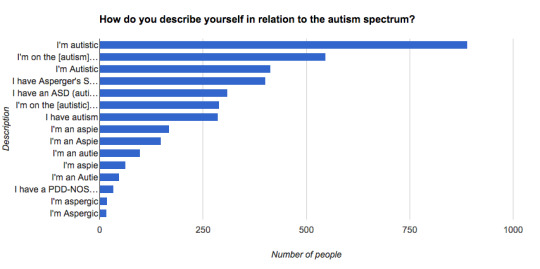
Generally, people preferred not to capitalise autistic, aspie, or autie. People preferred “autism spectrum” over “autistic spectrum”. Aside from that, people overwhelmingly preferred identity-first language - “I am autistic” rather than “I have autism”. The fourth most popular was Asperger’s Syndrome, which I thought was interesting, because my understanding was that it’s slowly being phased out.
The top 5 ways for us to describe ourselves were:
I'm autistic - 66.3%
I'm on the [autism] spectrum - 40.8%
I'm Autistic - 30.9%
I have Asperger's Syndrome - 29.9%
I have an ASD (autism spectrum disorder or autistic spectrum disorder) - 23.1%
It’s also worth noting that this question let you choose more than one answer, and lots of people chose both capitalisations. By this I mean that it was not uncommon for one person to choose both “I am autistic” and “I am Autistic”.
~
DIAGNOSIS
For this question, participants could again select as many as applied. I wanted to allow people to, for example, tell us that they had been formally diagnosed in childhood and self-diagnosed later - or that they had been formally diagnosed as a result of self-diagnosing and then being later diagnosed by a specialist.
While the survey was ongoing, I had a conversation with someone who was opposed to self-diagnosis and felt that it shouldn’t have been an option on the form. I didn’t feel I could remove it so late in the game, and anyway I knew that if it hadn’t been an option I would’ve had to process hundreds of people’s manual write-in “i’m self-diagnosed” submissions, so I left that option there.
But I also wanted to acknowledge that self-diagnosis is very context-dependent. The best I could think of doing that wouldn’t take an enormous amount of work was to split the results by all self-diagnosed people (including people who are formally or informally professionally diagnosed) and people who are only self-diagnosed.
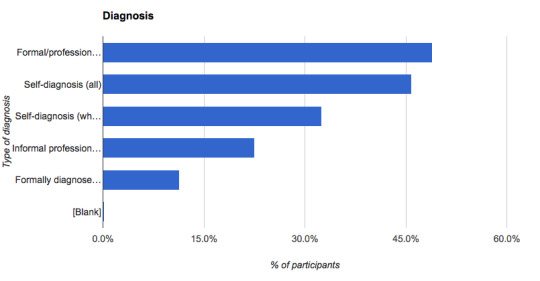
Here’s the numbers. Only two people didn’t answer this question.
Formal/professional/medical diagnosis - 49.0%
Self-diagnosis (all) - 45.8%
Self-diagnosis (where only this was selected) - 32.5%
Informal professional diagnosis - 22.5%
Formally diagnosed but not told about it at the time - 11.3%
~
PRE-DIAGNOSIS
I was curious about this because I know a few people who self-diagnosed before they were professionally diagnosed.
This question was single-choice-only, and there was no “other” box. About a third of participants didn’t answer at all - which matches the ~33% who are only self-diagnosed in the last question.
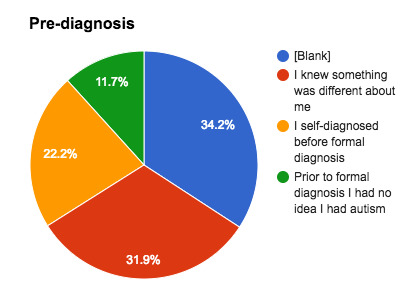
If I had more spoons I might look into whether age plays a part here. A friend of mine suggested that unless you have parents and/or teachers who’re very on-the-ball, you might have to work out what’s going on on your own, and that means that a lot of people might conclude that they’re autistic in their teens - around when a lot of kids are working out, for example, that they’re not straight.
~
AGE
Many graphs! Here’s the ages of all participants:
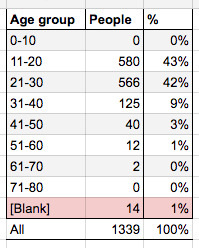
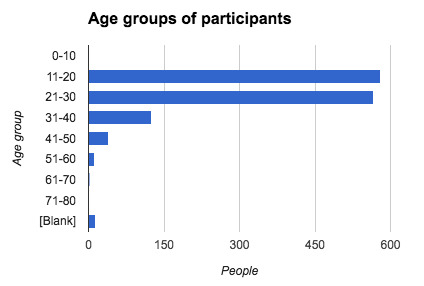
I feel I should very remind you here that this statistic shows how biased this survey is. This age graph is more representative of the ages of people who use Reddit, Tumblr, Twitter and Facebook than it is of autism in the general population by age.
This next graph is a bit more fun though:
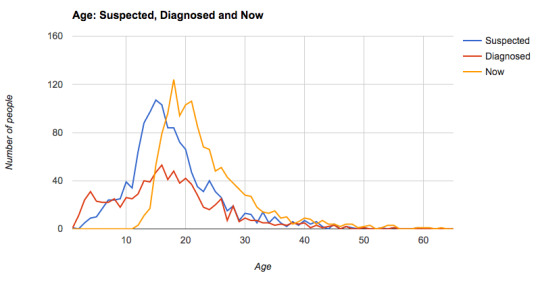
Age of diagnosis (red) is relatively spread out, because a lot of folks were diagnosed in childhood - presumably before they could work out they were autistic on their own, and instigated by parents who are a bit sensible and pay attention to how their kids are generally in life. The youngest age of diagnosis was 1, and the oldest 55.
You can also see how around the early teens people started to work out that something was up (blue), and there’s a corresponding bump in the red diagnosis line a few years later as those suspicions turn into formal diagnosis for a chunk of people - 22% of people in an earlier question knew that they were autistic before they were formally diagnosed.
Overall the yellow and blue lines suggest that most people worked out they were autistic, like, 3 years ago - in their early teens. And the red line suggests that a bunch of those people got a formal diagnosis soon after. There are a lot of people, about a third, who haven’t got a formal diagnosis, but perhaps this is not surprising - most participants were only in their late teens to early twenties when they took the survey. Since services and support for autistic people are so bad perhaps there’s not much advantage to getting diagnosed, especially if you’ve made it this far maybe not even knowing you’re autistic.
~
GENDER
My fave!
I’m sure a lot of you are aware of the anecdotal overlap between the trans/nonbinary and autistic communities. My gender identity clinic doctor, at the oldest gender identity clinic in the world, says that they see about ten times as many autistic people as are in the general population. And for a long time it was believed that autistic people were more likely to be gay - but now that being gay is more socially acceptable, the numbers are starting to converge. (I don’t have a source for this but I’d love one! If you’ve got it, throw it at me.) I’m curious to know whether there’s anything to suggest a similarity between the autistic-and-queer thing and the autistic-and-trans/nonbinary thing.
Again, this survey is very biased. It’s biased by age group and by the places participants came from, and the fact that it was a self-selecting sample on the internet. It would not be reasonable to extrapolate these figures to the general autistic population. On that note, here we go.
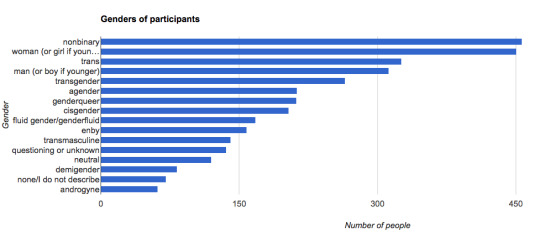
This is as many as I could fit onto the chart and still have all the gender labels showing. Here’s the percentages of the top 10:
nonbinary - 34.1%
woman (or girl if younger) - 33.7%
trans - 24.3%
man (or boy if younger) - 23.3%
transgender - 19.8%
agender - 15.9%
genderqueer - 15.8%
cisgender - 15.2%
fluid gender/genderfluid - 12.5%
enby - 11.8%
The low number of people identifying as cisgender is not as indicative as I first thought. It occurred to me that a lot of cisgender people wouldn’t describe themselves as such, and might not even know what it means. A lot of people whose genders differ from the ones they were assigned at birth also don’t relate to the trans/cis labels either.
The list of genders was taken from the annual survey of nonbinary people, which includes man and woman. I also added the three autism-related genders that I’ve ever heard of. There were a few comments in the feedback box by people who were annoyed by having to search through the long list for their gender; I’d guess around 5? But only two people skipped the question, so I’d guess the vast majority of people had no practical problems with it, even if a significant number of people may have disliked it. The wording of the question itself was taken from the results of a report from the Equality and Human Rights Commission, who found the following to be most inclusive: “Which of the following describes how you think of yourself?”
I was nosy about biases based on social networks, so I split the top 10 gender identities by social network:
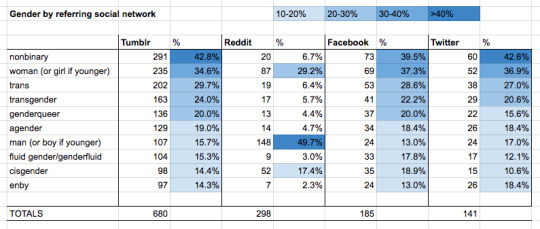
Reddit is notably less diverse, with a significantly smaller percentage than Twitter and Tumblr for every gender identity except cisgender and man/boy. The only reason I can’t say the same for Reddit vs. Facebook is because Facebook respondents were slightly more likely to say they were cisgender.
It’s worth noting that for Twitter there are only 141 responses, so the respondents here are likely only a few degrees of separation from me - and I am aware that my Twitter followership is mostly queer nonbinary people! (They’re only 10% of respondents though.)
I’ve run a few surveys of subreddit memberships in the past, and the percentage of nonbinary people is usually around 6-7% for the subreddits I tend to spend time in. (/r/bulletjournal, for example, and I ran one for /r/polyamory years ago but I have no hope of finding the URL of the results.) So it’s interesting to me that the autistic people of Reddit are just as likely to be nonbinary than the general population of Reddit.
The subreddits I promoted in were /r/autism, /r/samplesize and /r/neurodiversity.
~
SEXUAL AND ROMANTIC ORIENTATION
People could pick as many as they felt they identified with for both of these questions, and plenty picked more than one. For example, lots of people feel that terms like bisexual and asexual fit under the queer umbrella and could truthfully check queer and another term for one question.
The top five sexual orientations were:
asexual - 31.2%
queer - 30.3%
bisexual - 23.3%
pansexual - 18.4%
heterosexual - 16.8%
The top 5 romantic orientations were:
queer - 27.3%
panromantic - 25.1%
biromantic - 17.2%
heteroromantic - 15.2%
I don't know - 15.2%
This one I messed up a little. I regret not including “gay” and “lesbian” as checkbox options from the start; I added them at around 100 respondents, though earlier responses containing those words will still be counted in the stats. I also didn’t include “straight” at any point.
I only picked up on “gay” and “lesbian” because someone specifically said that they’re gay and they find the word homosexual to be really unpleasant, so they would have liked for gay to be added to the list. No one asked for “straight” to be included in the list, but a few people did write it in the “other” box.
A few people mentioned in the “other” box that I had missed demisexual and demiromantic off the list. If more than one person mentions a particular label I tend to assume that there’s a lot more who would check the box if it was there, so if I do this kind of survey again I will include them.
~
RELATIONSHIP PREFERENCES
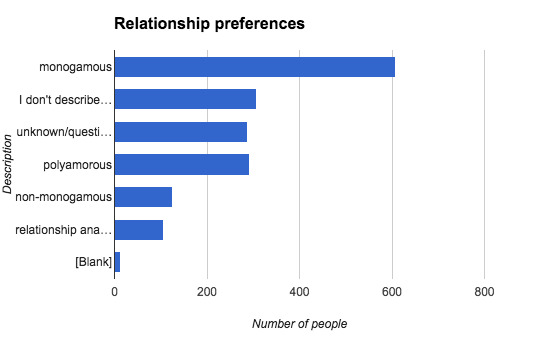
I have no idea how this compares to the general population or the Tumblr-Reddit-Twitter-Facebook population. But hey, it’s pretty cool, huh? Here it is in number form.
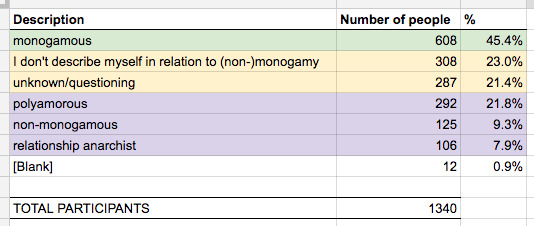
It started out being super non-monogamous, because I am non-monogamous and so a lot of my online circles are too. I could tell when the survey was making it out of my immediate circle, because at around the 300 participants mark it started to get a lot more monogamous.
~
LIVING SITUATION
I asked about current living situation and ideal living situation, and I’m thinking these figures are mostly representative of the fact that 85% of participants are between 11 and 30 years of age? I’m thinking as people get older they’re more likely to attain independence and an ideal living situation. But I’m not really sure!
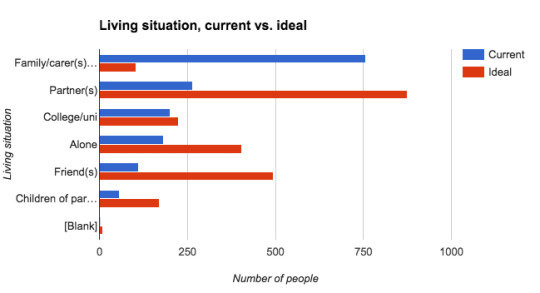
56% of people live with the family that raised them, and only 8% of them want to.
30% of participants want to live alone, but only 13% are doing so.
A little over a third of people would ideally like to live with friends, which I think is lovely and a very underrated and under-represented lifestyle choice!
And 20% of us live with partners, whereas 65% of us would prefer that. I wonder how many people living with partners would rather be alone, but it would be too much work for me to find out so there we are. Forever a mystery.
~
PERSON-FIRST vs. IDENTITY FIRST LANGUAGE
Identity-first language, as in “I’m autistic”. It acknowledges one’s autism as an inseparable part of one’s personality and sense of self.
Person-first language, as in “person with autism”. This seeks to define a person by their humanity rather than by their diagnosis.
I remembered that a while back the National Autistic Society in the UK did a survey and found that autistic people tend to prefer identity-first language. I was curious to see if my results would fit this, and they did - the majority of participants sometimes or always used identity-first language to describe their autism.
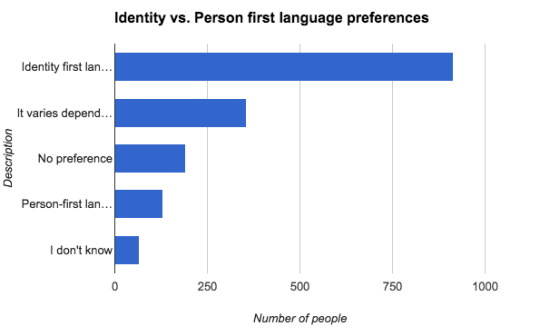
This was another question where you could select more than one answer, and there was an “other” box - but it’s very difficult for me to count those. Google Forms tells me 30 people selected “other”, but it doesn’t take into account the fact that some submissions were removed. If this number is accurate, then for perspective it’s less than half of the number who chose “I don’t know”.
~
DISABLED?
This question asked whether participants would describe themselves as disabled, in whole or in part due to their autism diagnosis.
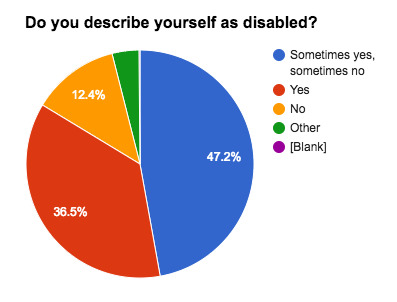
It seems that 83% of participants sometimes or always describe themselves as disabled due to their autism.
~
DESCRIBING OUR ASD-NESS
This one was a make-it-up-as-I-go question; for about 100 responses I’d put “disorder” and “condition”, because those were the only terms I could think of. After a few people had entered “neurotype” I added it to the list, and around that time I noticed a few people had put “difference” so I added that too. That means, I think, that over 1,000 people had all four options available to choose from.
Neurotype took the lead pretty fast despite being added after the start, and stayed ahead.
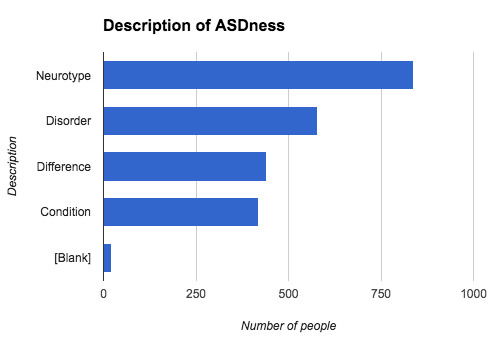
I can kinda imagine how this happened. Disorder is pretty negative, difference is a little condescending for a lot of people, and condition is a very medical-subtext word. They could all, depending on context, carry a less than implication. Neurotype, on the other hand, is a very neutral word. Autism is one of multiple neurotypes, alongside non-autistic, and probably other neurotypes. It puts autistic people on the same level as non-autistic people in terms of power and social status and mental health. It’s interesting, and I can see the appeal.
Again, this was a question that let you choose multiple answers and it’s very difficult for me to count the “other” answers, but Google Forms tells me it’s 146, around 11%. These included words like “disability” and “impairment”, and also terms like “my brain” and “a way of thinking”.
~
WHERE DID YOU FIND OUT ABOUT THIS SURVEY?
Again, a question that lets you choose more than one answer, and the “other” answers are hard to count, but Google Forms tells me it may be around 33, or 2.5%.
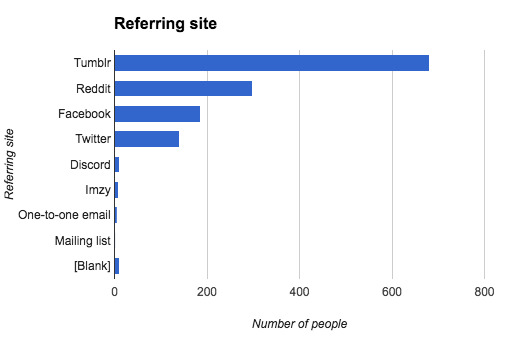
I feel like I’ve covered the stuff about diversity and bias regarding the social networks in sections above, so I don’t really have much to say here!
~
FEELINGS ABOUT AUTISM SPEAKS
This question was just thrown in there because it’s something I’ve always wondered. A lot of people are very angry-shouty about Autism Speaks. Is this the prevalent opinion, or does it just seem that way because of the aforementioned angry-shoutiness?
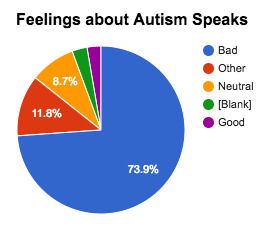
That’s a yes, most people did not feel good about Autism Speaks. And it’s worth noting that I listed the “other” answers in the spreadsheet because wow.
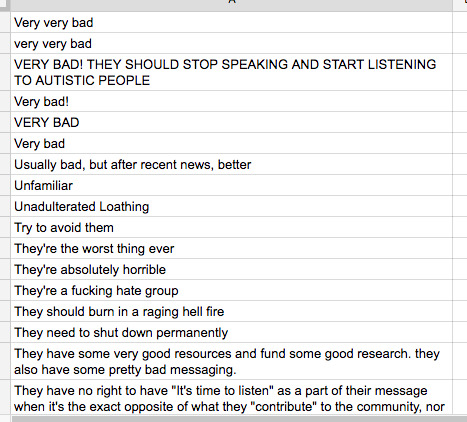
People skipped having their vote counted as merely “bad” in order to vent some pretty visceral feelings here.
~
OVERALL SUMMARY, THOUGHTS ETC.
Well, erm, I don’t really know what to say here. We are autistic and we use social networks, I guess? This was a lot of fun for me, and I hope the results are interesting for you too!
I threw this form together hastily, and that probably shows; I think I would be more thoughtful about the wording next time. I also used Google Forms, which is great and accessible and freeeeee but it does have some limitations - mainly in counting the “other” entries and not adjusting its Forms-associated summary graphs when I delete troll or duplicate entries. This is fine, it just takes more time and energy to get the blog post graphs and numbers to be helpful.
So yeah! Thank you for taking part, if you took part! And if you’d like to be notified of a future autistic survey that I may or may not run, please feel free to put your email address here. :)
636 notes
·
View notes